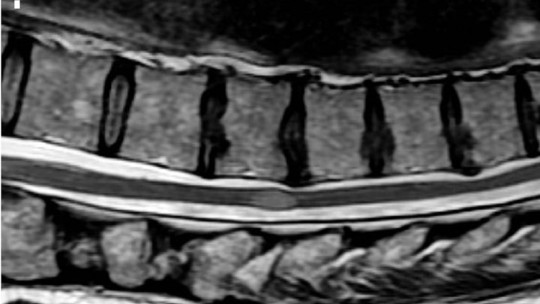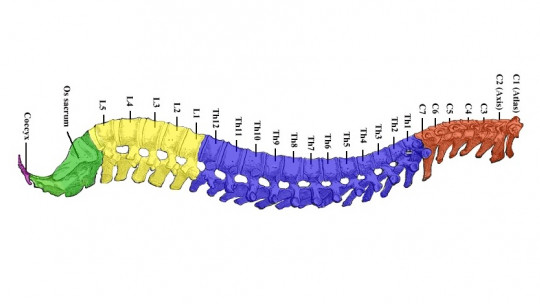Cognitive impairment due to multiple sclerosis is present in 40 to 65% of people suffering from this disease and affects functions such as memory, language or executive functions.
Let’s look in more detail at what this disease consists of and the cognitive impairment it causes.
What is multiple sclerosis and how does it occur?
Multiple sclerosis is a chronic, autoimmune, central nervous system disease It is one of the most common neurological disorders among the population between 20 and 30 years old.
This disease affects the myelin or white matter of the brain (substance that surrounds and insulates the nerves) and the spinal cord, causing the appearance of sclerotic plaques that impair the normal functioning of these nerve fibers.
The immunological abnormality that causes multiple sclerosis manifests itself in symptoms such as: fatigue, lack of balance, pain, visual and cognitive disturbances, speech difficulties, tremors , etc. In addition, sometimes cognitive deterioration occurs that affects cognitive functions such as memory, language or executive functions.
The etiology of the disease is complex and is related to different genetic and environmental factors, such as Epstein-Barr virus infection, tobacco, vitamin D deficiency or ultraviolet light.
Types of multiple sclerosis
The course of multiple sclerosis cannot be predicted, and the cognitive impairment it causes can vary from one individual to another and depending on the phenotype of the disease.
Currently, the following multiple sclerosis phenotypes have been described:
Cognitive deficits in multiple sclerosis
Cognitive impairment in patients with multiple sclerosis has a great impact on these people’s activities of daily living. The main cognitive domains affected in this disease are detailed below.
1. Memory
Memory is affected in 40 to 65% of patients The main deficit is observed in the processes of acquisition, encoding and learning of information, which manifests itself, for example, when remembering names, conversations or book arguments.
Patients need a greater number of trials and repetitions to learn, although once they have learned a piece of information, performance on recall and recognition tasks is similar to that of healthy subjects.
2. Attention and speed of information processing
These cognitive functions are affected in 20 to 25% of patients with multiple sclerosis They are altered practically from the beginning and indicate an incipient cognitive deterioration.
Patients have problems maintaining and manipulating information in working memory tests, as well as in tasks that require a certain processing speed.
They also show difficulties following a conversation, a reading or a movie, as well as processing the information they have just seen, when the activity has already changed.
3. Executive functions
Executive functions are altered in 15 to 20% of patients This alteration manifests itself in tasks that require abstract reasoning, planning, problem solving or cognitive flexibility.
On a daily basis, patients have difficulties when they need to plan details of a trip, manage resources or keep an agenda, for example. They also have many problems anticipating events and changing strategies to provide solutions.
4. Language
Between 20 and 25% of patients see their language altered in multiple sclerosis The main difficulty is observed in verbal fluency, the ability to produce fluent spontaneous speech. This alteration also influences the impairment of recall memory, executive functions and processing speed.
Although language is affected, aphasia is not very common in this disease.
5. Visuo-spatial functions
The visuo-spatial functions, responsible for representing, analyzing and manipulating objects mentally , are affected in 10 to 20% of patients with multiple sclerosis. The patient presents difficulties in recognizing objects, such as faces, and in performing relational and visual integration tasks and processing shapes.
Complications are also observed in spatial calculation (depth perception), which can cause problems driving vehicles, due to the alteration in the perception of distances.
Treatment of cognitive impairment in multiple sclerosis
The usual non-pharmacological treatment in multiple sclerosis patients usually includes cognitive rehabilitation an intervention designed to improve cognitive functions, with the aim of improving the patient’s functionality.
According to scientific studies, this type of cognitive intervention provides benefits to patients, with improvements in cognitive domains such as memory and in the general quality of life of the affected people.
However, definitive conclusions cannot be made about the effects of cognitive rehabilitation on the mood and quality of life of patients, because different rehabilitation techniques have been used, there has been a lack of sensitivity in the measures used. to evaluate results and small samples have been used.
Regarding pharmacological treatment, various studies with stimulant drugs such as amantadine, l-amphetamine or modafinil have not yet shown conclusive data regarding their effectiveness, despite the fact that they have been used in this type of diseases.
Drugs used in Alzheimer’s disease, such as cholinesterase inhibitors, donezepil, rivastigmine or memantine, have also not demonstrated conclusive efficacy.
Prevention in multiple sclerosis: cognitive reserve
Cognitive reserve is the ability of our brain to compensate for the deterioration related to aging or cognitive decline resulting from disease. This capacity is determined, to a large extent, by the brain activity previously maintained, the knowledge acquired and the good or bad habits adopted.
Recent research has confirmed that cognitive reserve in multiple sclerosis constitutes a protective factor against long-term neurocognitive deterioration. This could modulate the severity of the symptoms of deterioration, modifying the clinical expression of the disease itself.
Practice daily stimulating activities that involve a certain cognitive effort, such as reading, physical exercise or playing intellectual games, appears to increase this cognitive reserve that may help multiple sclerosis patients prevent future declines









